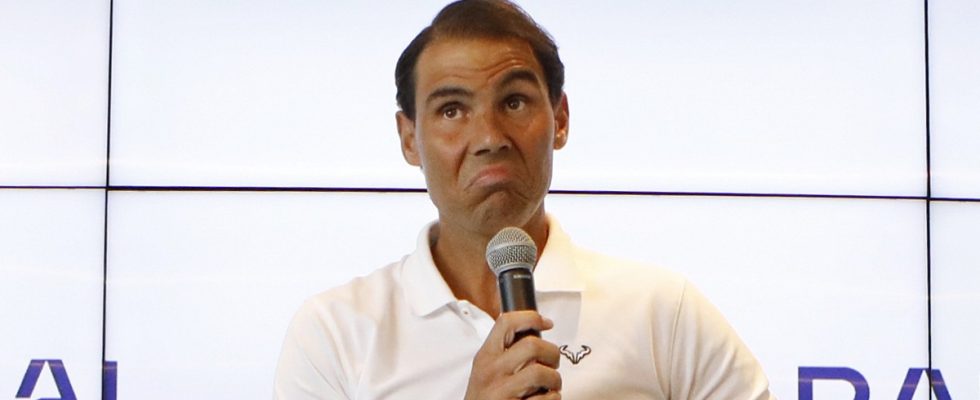Large tremors often precede foreshocks. Such a small eruptive tremor was now measurable, figuratively, on the tennis courts of the Foro Italico in Rome. Surprisingly, the defending champion said goodbye to the tournament, which is considered the last major test before the French Open: Novak Djokovic, 35, the Serbian tennis emperor and 22-time Grand Slam winner, had to retire in the quarterfinals of the Italian Open, which he had won six times, defeating the Dane Holger Rune. He was physically ill and suffered from back pain.
However, Djokovic’s disappointment was nothing compared to the frustration shown by Alexander Zverev as he stepped in front of the cameras in Rome with his hair tousled and his eyes fierce. He was “a thousand kilometers away” from the form of his closest rivals, he explained after the defeat (2:6, 6:7) against the Russian Daniil Medvedev, the third this year after Indian Wells and Monte Carlo. At the moment of losing, Zverev often tends to excessive mortification, in Rome the self-reproach was that he was currently playing “probably my worst tennis since 2015, 2016”.
In fact, Zverev, 26, was outshined by the shine of a colleague from his own association in the Foro Italico: Yannik Hanfmann, 31, from Karlsruhe, made it through to the quarter-finals as a qualifier, where he only lost to Medvedev on Thursday (2: 6, 2: 6). Previously, Hanfmann had knocked out two top ten players, the American Taylor Fritz and the Russian Andrei Rublev, one after the other. Zverev, on the other hand, now has to accept that he is no longer nominally the best German tennis professional: Jan-Lennart Struff has overtaken him as number 28 in the world rankings. That also looks like a small tennis foreshock before the French Open.
Since his first start in Paris in 2005, Nadal has shaped the French Open – and won an insane 14 times
The seismographs then hit violently on Thursday in Mallorca on the open shock scale: Rafael Nadal, 36, had asked for a press conference in Manacor, where he lives, and announced the inevitable. The French Open in Paris will take place this year without the Spanish record winner. “I won’t be able to be at Roland Garros,” said Nadal, “it’s impossible.” It was a decision that hurt him: “If you know what Roland Garros means to me, you can imagine how difficult it is for me.” He announced that he will not be able to play in the coming months either because his long-term hip injury has not yet healed.
In the context of Roland Garros, this can actually be seen as the greatest possible eruption. In the history of tennis, no ball artist has shaped, changed and dominated a major tournament like Nadal the French Open at the Bois de Boulogne, where he is revered as a king of sand and sun: he has triumphed fourteen times in Paris. Since he entered the facility for the first time in 2005, back then in a green muscle shirt, with a white headband in his long hair and knee-breeches, he has won 112 matches and lost only three. And never in the past 18 years has he missed this tournament, his tournament.
But the decades of his exhausting game, his dynamism and phenomenal power in the exchange of blows, took their toll. Like Nadal’s 22 Grand Slam victories, injuries, surgeries and long periods of regeneration are hallmarks of his career. Last year he won the Roland Garros final despite a cartilage in his foot that he has been struggling with for years. In Wimbledon he had to give up a few weeks later before the semi-finals, a tear in the abdominal muscle was diagnosed. Finally, in January, at the Australian Open, he lost in the second round after sustaining a hip flexor injury while sprinting down the baseline in the match and limping out of the arena, bent over with grief and pain.
It’s been exactly five months to the day. Rafael Nadal has not played a tournament since then. “I worked every day,” he reported in Manacor, but there was little improvement and no return to the tennis tour anytime soon. “It’s a moment where I have to try and stop and see if the body regenerates and the burden of everything is lifted,” he said. “When I feel ready, I’ll come back.”
He left open the question of when that will be. His goal, Nadal said, is to put himself in a position to enjoy the degree as a tennis pro. Next year should be the last of his career: “I want to say goodbye to all the tournaments that are important to me.” Including the Olympics and, of course, the French Open.
The Paris tournament, that’s already certain, will be different without its victor. And it will choose Nadal’s successor in a few weeks.

